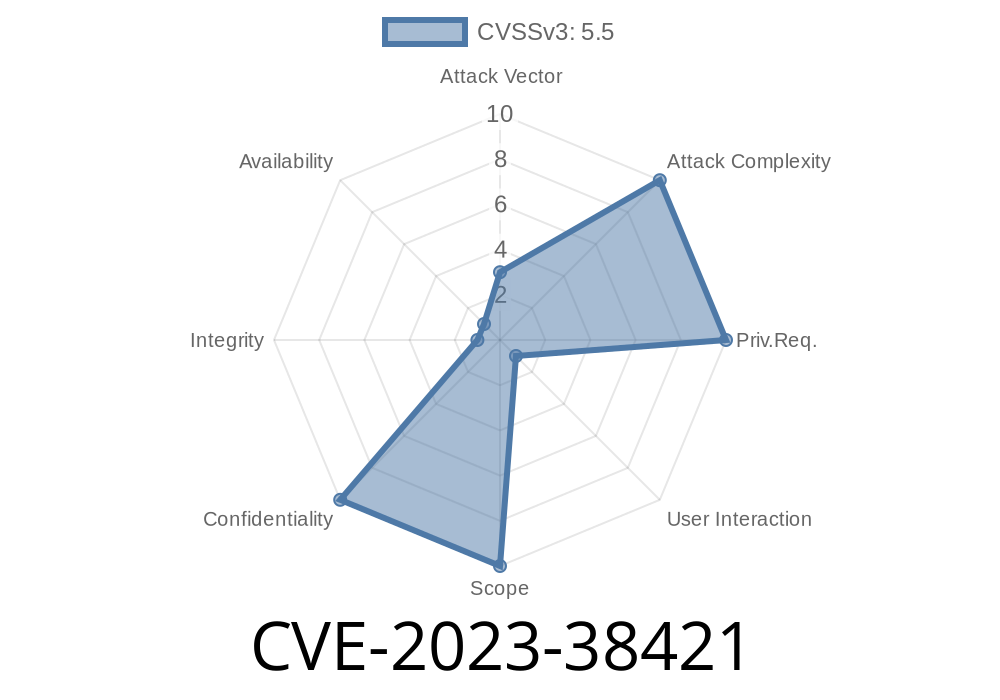In July 2023, Apple quietly patched a worrying vulnerability in their macOS operating system: CVE-2023-38421. This weakness could allow a maliciously crafted 3D model file to leak sensitive process memory—potentially exposing personal documents, passwords, encryption keys, or other private data from unsuspecting users. In this article, we break down how the vulnerability works, its impact, show you a simplified exploit approach, and discuss the Apple fix.
1. What is CVE-2023-38421?
CVE-2023-38421 is a memory disclosure vulnerability affecting Apple’s macOS, specifically in how the system processes 3D model files. According to the official Apple security release notes for July 2023, this issue can be triggered by simply handling (e.g., previewing) a specially-crafted 3D model.
macOS Ventura before 13.5
> "_Processing a 3D model may result in disclosure of process memory._"
> — Apple Security Update, July 24, 2023
The fix:
Apple addressed the flaw in macOS Ventura 13.5 and Monterey 12.6.8 by improving how the system checks 3D files before parsing them.
What Actually Happens?
When macOS opens a 3D model (for example, .obj, .usdz, or .dae files), the system tries to parse it so that you can view it in Preview or Quick Look. The vulnerable code failed to properly check certain sizes, indexes, or offsets—meaning a malicious file could trick macOS into reading *outside* the expected memory boundaries and including process memory fragments as part of the loaded model.
Let’s simulate a basic proof-of-concept (PoC) crafted file, using a simplified example
Suppose the vulnerability was in handling the "vertex list" in a .obj file, and the parser allowed us to specify a higher vertex count than actually present.
Malicious .obj file snippet:
# Malicious OBJ file to trigger memory read
v . . .
# ... Only one vertex, but will claim many exist ...
# Command that, due to poor checking, might make the parser read past vertex array
f 1 100 200 300
The face (f) references vertex indices way beyond the actual count.
- A parser not properly bounds-checking would read additional data from contiguous memory, possibly unrelated process memory.
Python Pseudo-code Simulating the Vulnerable Parser:
def parse_obj(file):
vertices = []
faces = []
for line in file:
if line.startswith('v '):
vertices.append(tuple(map(float, line.split()[1:4])))
elif line.startswith('f '):
indices = [int(i) - 1 for i in line.split()[1:]]
# The buggy line:
face_vertices = [vertices[i] for i in indices] # No index checking!
faces.append(face_vertices)
return faces
# A maliciously crafted file can cause vertices[i] to read out-of-bounds memory!
In a real exploit: The 3D parser could return portions of memory from before or after the vertices array, potentially sending out secrets or passwords embedded in the process heap.
- Apple disclosed this vulnerability in their official update notes
- Apple Security Updates: macOS Ventura 13.5
- macOS Monterey 12.6.8 Release
5. The Fix: Better Input Validation
After this flaw was identified, Apple’s engineers updated the model-parsing code to check that all references to file data (like indexes or offsets) are *within the size of the parsed arrays*. If a face command tries to reference a vertex number that doesn’t exist, the parser now triggers an error instead of fetching memory “leftovers”.
Safer Parsing Approach:
def parse_obj_safely(file):
vertices = []
faces = []
for line in file:
if line.startswith('v '):
vertices.append(tuple(map(float, line.split()[1:4])))
elif line.startswith('f '):
indices = [int(i) - 1 for i in line.split()[1:]]
# Add index checking!
try:
face_vertices = [vertices[i] for i in indices if i < len(vertices)]
faces.append(face_vertices)
except IndexError:
print("Malformed OBJ file - face index out of range!")
return faces
6. How to Stay Safe
- Update now: If you use macOS Monterey or Ventura, make sure you’re on 12.6.8 or 13.5 (or later).
Be wary: Don’t open 3D model files from untrusted sources.
- For IT: Use Apple’s security advisories to track the latest updates.
7. Additional Reading
- Apple macOS Ventura 13.5 Security Update
- Official CVE-2023-38421 entry
- OWASP: Unprotected Memory Exposure Risks
Summary
CVE-2023-38421 makes it clear that even common features—like previewing a 3D file—can have unforeseen security risks if developers don’t strictly check file boundaries. Apple’s quick response helped protect millions from silent data leaks. Always keep operating systems up to date, and remember: treat files (even pretty 3D ones!) from strangers with caution.
*If this post helped you understand CVE-2023-38421, share it with your team! Stay safe.*
Timeline
Published on: 07/27/2023 01:15:35 UTC
Last modified on: 08/03/2023 16:17:24 UTC
